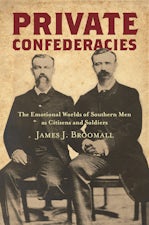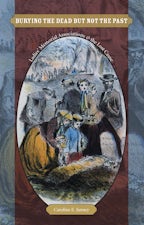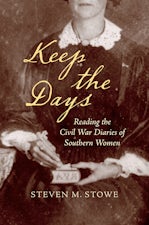Love and Duty
Confederate Widows and the Emotional Politics of Loss
By Angela Esco Elder
224 pp., 6.125 x 9.25, 13 halftones, notes, bibl., index
-
Paperback ISBN: 978-1-4696-6774-4
Published: April 2022 -
E-book EPUB ISBN: 978-1-4696-6775-1
Published: March 2022 -
E-book PDF ISBN: 979-8-8908-5688-3
Published: March 2022 -
Hardcover ISBN: 978-1-4696-6773-7
Published: April 2022
Civil War America
Buy this Book
- Paperback $27.95
- Hardcover $95.00
- E-Book $21.99
For Professors:
Free E-Exam Copies
Confederate officialdom championed a particular image of white widowhood—the young wife who selflessly transferred her monogamous love from her dead husband to the deathless cause for which he’d fought. But a closer look reveals that these women spent their new cultural capital with great shrewdness and variety. Not only were they aware of the social status gained in widowhood; they also used that status on their own terms, turning mourning into a highly politicized act amid the battle to establish the Confederacy’s legitimacy. Death forced all Confederate widows to reconstruct their lives, but only some would choose to play a role in reconstructing the nation.
About the Author
Angela Esco Elder is assistant professor of history at Converse College.
For more information about Angela Esco Elder, visit
the
Author
Page.
Reviews
"Disputes over the meaning of conflicts continue long after the shooting stops. The Civil War ended some 157 years ago, but Americans still argue about how to remember it. Was Lee, for example, a noble Virginian or a heartless whipper of captive humans — and should his statue stand in our cities? [Love and Duty] grapple[s] with such questions by examining the rich subject of American funerals in the 19th century."—Thomas E. Ricks, New York Times Book Review
"Angela Elder's important book adds to the growing history of emotions during the Civil War . . .Love and Duty is a very readable book, deplete of jargon, and filled with fascinating stories of Confederate widows."—Civil War Book Review
“A detailed study of Confederate widows . . . examines how these women behaved with their husbands and how they survived without them.”—Taylor Hill, H-Net Reviews
“This monograph is a good update to numerous other studies of how elite white southern women experienced the war and its aftermath.”–Journal of Southern History
"Drawing on an impressive array of personal manuscripts and scrapbooks, Love & Duty extends recent scholarship on the diversity among women’s experiences during the Civil War and its long aftermath.”—Brian Matthew Jordan, The Civil War Monitor
“Elder has written a smart cultural history that sympathetically recovers the lives of widows and systematically documents the Civil War’s destruction and its aftermath. The book is both a delight to read and a significant contribution.”—James J. Broomall, Shepherd University




